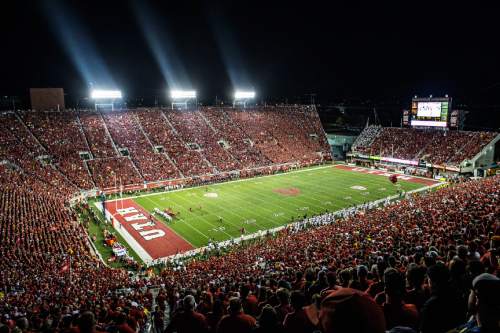This is an archived article that was published on sltrib.com in 2016, and information in the article may be outdated. It is provided only for personal research purposes and may not be reprinted.
While some of the Pac-12's wildest moments on the gridiron have come after dark, it has been a challenge for fans to stay up to watch.
The league's CEOs and presidents announced the Pac-12 had amended its deal with FOX and ESPN to reduce the number of late kickoffs for football games — one of four announcements in a news release out of the spring meetings for the conference's leaders.
Of the announcements, the late kickoffs may be the biggest relief for red-eyed fans who have complained that Pac-12 football pushes back bedtime more than any other Power 5 conference. The Utah Utes, who spent a significant chunk of the season in the national rankings (and thus were subjected to more prime-time scheduling) kicked off four games at 8 p.m. MDT or later last season.
The restructured deal will allow Pac-12 Network-televised games in 2:30 p.m. or 6 p.m. local time slots to overlap with FOX- or ESPN-exclusive games, which should allow the conference greater flexibility in kicking off earlier.
The other big change that potentially influences fans: The Pac-12 will now charge escalating fines for court- or field-storming.
An issue that got attention following Arizona basketball coach Sean Miller's complaints about a Colorado court-storm, the practice now comes with a $25,000 fine for the first offense, $50,000 for the second, and $100,000 for a third.
The institutions themselves will be charged.
"This enhanced policy underscores the importance our universities place on the safety and welfare of our student-athletes, officials and fans," Cal athletic director Mike Williams said in the release, "and will allow us to educate staffs and fans on procedures going forward."
The conference also released a report on student-athlete time demands after commissioner Larry Scott spent the spring touring campuses and meeting with athletes in person. The crux of the report reflects the long-understood issue that student-athletes are committing more time to their sports and studies than NCAA rules reflect, and suggest stricter guidelines on issues such as practice time limits, sporting events during exam weeks and dead periods following the season.
The NCAA tabled two legislative items proposed by the Pac-12 in autonomy meetings in January, and is expected to seek more comprehensive legislation next year.
The Pac-12 also will begin conference-sponsored video game events, sometimes known as "eSports," next year with teams based on specific video games. The competition will consist of head-to-head matches, as well as a tournament championship.
The league will announce the video game titles and events in the coming months.kgoon@sltrib.com
Twitter: @kylegoon —
Feugiat euismod ut wisi sed diam
Olendrem eugiamet dio dip et verit, vulpute cor amet velent am volesto odiamcommy nim dipit ut ullutet prate duisi. Rud dolobor suscidunt am, con heniamet illum nismodolore coreet. › XX



